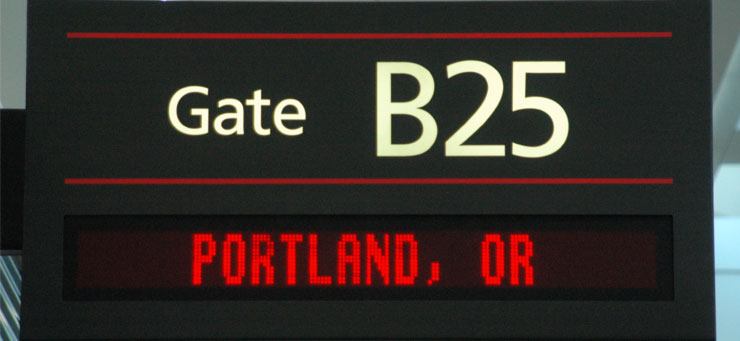
It’s a commonly known hack among the initiated. Even Trevor wrote about how the “hidden city” trick can be good for the pocketbook. But is hidden city ticketing a bad practice that could create harm to the travel ecosystem? That’s what two recent lawsuits against a website specializing in hidden city ticketing are suggesting.
Skift recently wrote about the lawsuits against Skiplagged, by both Orbitz and United Airlines. Orbitz claims that booking these potentially cheaper fares threatens their relationship with a number of airlines that ban the practice, including all three American legacy carriers, as well as IAG-owned British Airways and Iberia. Meanwhile, United claims that the tickets “discovered” by Skiplagged are in violation of United’s ticketing rules, which prohibit hidden city bookings.
It’s important to note that Skiplagged, as it’s own entity, is not an OTA by the traditional definition. Flyers are still buying their tickets from Orbitz, CheapOAir, or other OTA websites. Although, as a result of the lawsuit, it seems that Skiplagged has turned off hidden city ticketing links for the time being.
While this lawsuit works itself out, it does require travelers to ask a bigger question. Is the practice of buying hidden city tickets really a bad thing?
The argument for hidden city ticketing
As many travelers have pointed out, hidden city ticketing is a good way to save money on an itinerary. By booking to a different destination than the one you’ll ultimately end up at, frequent fliers can save potentially hundreds of dollars. In Trevor’s example, a traveler going to Charlotte can save around $10 by booking through to Cleveland instead, but conveniently “missing” the final leg of the flight.
In addition, hidden city ticketing has not always been an outlawed practice. In a column written in 2001, George Hobica (the man behind AirfareWatchdog.com, who also wrote an excellent viewpoint about hidden city ticketing on LinkedIn) pointed out that several airlines didn’t expressly forbid the practice of hidden city ticketing. But of the airlines mentioned in the 2001 article, only Southwest and Frontier still exist. United merged with Continental, Northwest merged with Delta, AirTran is now officially Southwest, America West became US Airways, and ATA went flat out of business. And with those mergers came the rules that banned hidden city ticketing officially on all three legacy carriers.
Of course, there is always the argument of ethics in dealing with companies. To which some people may respond: “When have large, multinational companies been concerned with ethics?” That’s a personal decision every traveler must make for themselves.
The argument against hidden city ticketing
Aside from the ethics of potentially illegal ticketing, airlines have been known to push back against chronic hidden city travelers. In an active thread on FlyerTalk dating back to 2011, travelers have discussed hidden city ticketing warnings that include receiving warning letters from airlines.
In addition, it has been rumored that airlines can ban frequent hidden city travelers from booking with them in the future, and even (possibly) pursue damages. This can also include stripping travelers of their frequent flyer accounts (gasp)! Delta Air Lines spells it out very clearly: hidden city ticketing is against their policies, and those caught in the practice are subject to penalties, including (as quoted from the Delta website)
-
Cancel[ing] the remainder of the itinerary and confiscate any unused flight coupons.
-
[Refusal] to board the passenger or check baggage.
-
[Charging] the passenger for the difference between the fare paid and the fare for the passenger’s traveled itinerary.
Traveler discretion advised with hidden city ticketing
All of the information available suggests that, although strictly forbidden by airlines, hidden city ticketing is still a gray area that a penny-pinching flyer can still slide through. While it can be an easy way to travel on the cheap, it may come with some unintended side effects that could ultimately affect how you travel. As we often say in this business: your mileage may vary.
Have you tried hidden city ticketing? Have you received any blowback from it? I’d like to hear your take on the practice – leave me a comment below!
I recently discovered an opportunity to buy PDX-OAK-LAX for $100 less than PDX-OAK. Then I decided to fly all the way to LAX anyway. If I hadn’t been thinking of hidden city I would have paid the $100 more plus a second ticket to LAX the next day!
Pingback: TaggingMiles Weekly Travel News Roundup: January 30, 2015 – Tagging Miles